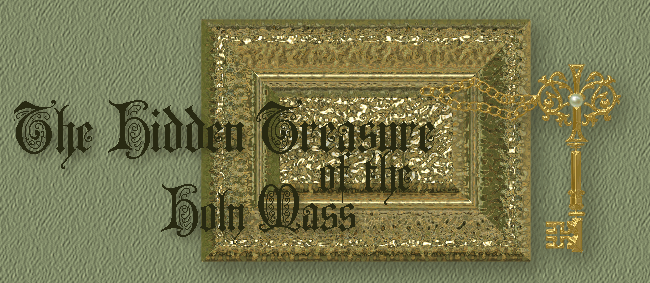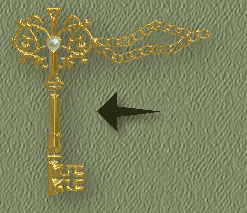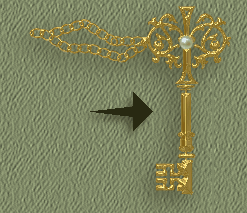

by St. Leonard-Port Maurice
Nihil Obstat and Imprimatur, 1890
TAN BOOKS
In the world you will have affliction. But take courage,
I have overcome the world.
------- JOHN 16:33

| Chapter 3: ON HEARING MASS DAILY, PART 6: A SOLEMN WARNING Two Doctors of the Church, the angelic St. Thomas and the seraphic St. Bonaventure, teach, in conformity with the foregoing instruction, that the thrice-holy sacrifice of Mass is of infinite value, both by reason of the Victim Who is offered, namely, the Body, Blood, Soul, and Divinity of Jesus Christ Our Lord, and also by reason of the primary Offerer, Who is no other than the same Jesus Himself. Yet by how many is it so little valued that they postpone the inestimable treasure to every vile and petty interest! This little work is drawn up for the express purpose that all who shall deign to read it may remain enlightened for all time to come, and may arrive at something like a due conception of a pearl that is beyond all price. And if hitherto this holy sacrifice has been to them a hidden treasure, now that its infinite value has been pointed out, may they resolve to possess it by a daily share in the priestly act! To promote this end, I narrate the following dreadful incident, which shall serve for the seal to all my words. Aeneas Silvius, afterward Pius II, recounts how in a city in Germany there lived a person of distinction, the principal inhabitant of the place, who had fallen into great difficulties, and had withdrawn into a country house, with a view to economy. There, overwhelmed by melancholy, he was on the verge of despair. The enemy saw this, and the temptation which he constantly instilled was the longing to slip a cord about his neck, and so have done with life. A dry tree, said the Evil One, is good for nothing but the hatchet. In this conflict of grief and temptations, the nobleman had recourse to a holy confessor, who gave him this good advice: "Do not let one day pass without hearing holy Mass, and have no fear." He accepted the advice, and promptly began to put it into execution; and in order to make sure of never losing holy Mass, he gave a salary to a chaplain, who, at his request, constantly offered the adorable sacrifice, at which he took care to assist every morning with pious devotion. But it happened that one day his chaplain went at an early hour to a neighboring village, to assist a young priest, who was about to celebrate his first Mass. The devout nobleman, fearing that he would that day be deprived of the sacrifice, hastened to the same village, in order to be present at it. On the way he met a peasant, who told him that he might as well turn back, because the last Mass was ended. Much disturbed in mind, the nobleman began even to shed tears. "Alas! what shall I do?" he kept repeating. "What shall I make of myself today? Perhaps it may be the last of my poor life." The countryman was astonished to see him so much agitated; and being himself a man careless of his soul, he exclaimed, "Pray, do not weep, my lord, do not weep; for my part, if it is a thing that can be done, I don't a bit mind selling you my share in today's Mass. Give me that good cloak off your back, and, for aught I care, my Mass is yours this moment." The nobleman agreed gladly to the strange proposal, thinking he would take the chance of possibly getting something by it, at least for his good intentions' sake, and so, handing over his cloak, he pursued his path toward church. There he offered a short prayer; and on his return, had hardly got to the place where the bargain had been struck, when he saw the miserable man who had conceived the profane and extragavant design of selling his Mass hanging by the neck from an oak, and already dead, like another Judas. In fact, the temptation to self-destruction had passed into the unhappy peasant, who had voluntarily deprived himself of the aid which he might have had from the sacrifice, and designedly left himself powerless to resist the malignant suggestions of the devil. Then the worthy nobleman began to perceive how effectual was the remedy which his confessor had advised, and was from that moment confirmed in his holy determination daily to assist at the Divine mysteries. I should wish you to extract from an incident so mournful a due perception of two points of great importance: first, how horrible is the excessive ignorance of some Christians who, not recognizing the immense preciousness of holy Mass, come to treat it as a matter of vulgar purchase for filthy lucre. Thence, sometimes, the indecent language with which such persons will address a priest; as, for instance, "May I pay for a Mass this morning?" Pay for Mass! And where will you find capital for that? What is the equivalent for a Mass, when one unbloody sacrifice of Christ outweighs in value the whole of paradise itself? Such ignorance is intolerable. The trifle you give to the priest is a gift toward his daily support, not in any sense the payment of so much purchase-money, for holy Mass is a treasure without price. It is true that in this little work I have exhorted you to hear holy Mass every day, and cause it to be celebrated as often as you can; and who knows, therefore, whether the devil may not have put into your head the suspicion that monks exhort you with fine and specious arguments to get Masses celebrated, but that all is not gold that glitters; that perhaps they seek their own gain, under the show of zeal, and that when you peep behind the mask you will, very likely, find that all is said for their own interests. Oh, how much you would deceive yourselves if thus you thought! I thank God, Who has caused me to embrace a religious institute in which is professed the strictest and most perfect poverty, where no alms are received for Mass, and where no sum, however great, would be looked at on such an occasion, for we say all our Masses with no other intention than that which Christ had on the cross when He offered to the Eternal Father that first sacrifice on Calvary. Therefore, if anyone may speak out clearly on this subject, without any fear of reproval, it is I, who seek merely your good; as I do in all the other matters touched on in this little book, which now at its close I sum up afresh. Hear many Masses, I beseech you; hear many; cause many to be celebrated; get as many as you can. Make sure of this great treasure, which will be to you indeed a treasure both in this world and the next. The second point to be extracted and stored up out of the incident now narrated is the efficacy of holy Mass for winning every benefit from on high, for procuring exemption or escape from every evil, and particularly for obtaining or reinvigorating our spiritual energies, so as to insure victory over all temptations. Let me, then, repeat: to Mass, I beseech of you; to Mass, if you want to triumph over your soul's enemies, and to behold all Hell cast down and trampled under your feet. One single counsel remains to be repeated, one applicable alike to clergy and seculars, which is, that to obtain in great abundance the fruits of holy Mass, you must hear it with the deepest devotion. I have struck at this nail several times in the course of my little book, but now just at the close, I must beat at it with still more vigor. When at Mass, keep deeply engaged in devotion; and, if you like, make use of this book, putting it in practice with all the exactitude prescribed in the second chapter. I boldly refer you to experience as your master; for in a short time you will be conscious of a sensible change in your heart, and you will, so to speak, be able to touch with your very hand the great blessing which you will carry at your heart. And for you, O priests, tremble before the justice of God if, either by excessive haste or irreverent negligence, you transgress the rules of the sacred ceremoines, if you hurry out your words, or confuse the different acts, and, in short, bustle slipshod through your Mass. Reflect that then you consecrate, you touch, you receive, the Son of the Most High; nor are you blameless in regard to each the very slightest ceremony which you either leave out or perform more or less imperfectly. Such is the teaching of the most learned Suarez, when he treats of the question, Vel unius caerimoniae omissio culpae reatum inducit (T. 5, in 3 part. dist. 85. lect. 2). Whence that oracle of Spain, [St.] John of Avila, was always firmly of opinion that the Eternal Judge will, in the case of priests, make, before every thing else, a most rigorous scrutiny into all the Masses they have celebrated. Thus when on one occasion a young priest had departed to the other world, just as he had barely finished his first Mass, the holy man, hearing of his death, heaved a sigh, and asked, "Had he ever offered Mass?" And when they told of his happy fate in dying so soon as his first Mass was celebrated, "Ah," he resumed, "he has much to thank God for if he has once celebrated Mass!" But you and I, who have celebrated so many, how shall we pass before the tribunal of God? Let us, then, make the holy resolution to re-study (at latest in our first spiritual retreat) all the rubrics of the Missal, and all the sacred ceremonial, so as to celebrate for the future with all the exactness possible. It is my hope that if we priests shall generally celebrate with serious and devout exterior composure, and, what is far more, with thorough interior fervor of soul, the laity will return to daily hearing of holy Mass, and to hearing it with deepest devotion. Thus we shall have the joy of beholding renewed in the Christians of our time all the fervor of the first believers of God's Church, and thus will our most gracious and Almighty God be supremely honored and glorified------the sole and single aim of this poor work. Reader, say for me one "HAIL MARY." St. Leonard is in Heaven, and needs no prayers: the charitable reader will perhaps say the "Hail Mary" for him who has translated these pages. Your Web Master would appreciate one also. BACK TO THE TOP OF THE PAGE |

 Contact
Us
Contact
Us

HOME-------------BLESSED SACRAMENT VISITS
www.catholictradition.org/Eucharist/hidden-treasure3f.htm